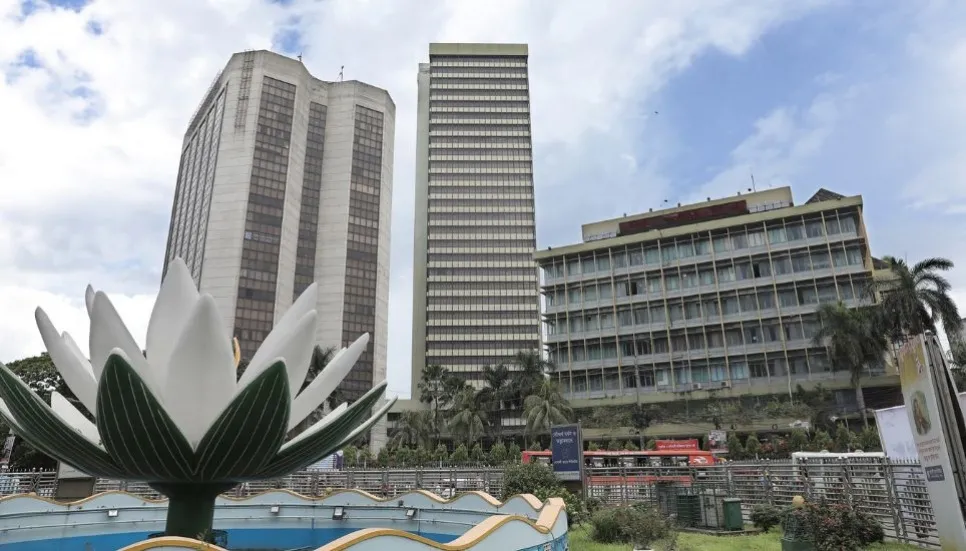
The Bangladesh Bank – in a bid to rein in inflation and safeguard the forex reserves – has hiked the policy rate even further, and introduced the crawling peg system for foreign exchange as per the International Monetary Fund (IMF) directions.
A crawling peg is a system of exchange rate adjustments in which a currency with a fixed exchange rate is allowed to fluctuate within a band of rates.
The Bangladesh Bank on Wednesday raised the policy rate by 50 basis points to 8.50 per cent and withdrew the SMART system for the bank interest rate. This rate will come into effect on Thursday.
From now on, banks and non-bank financial institutes (NBFIs) can set interest rates based on the interaction of demand and supply in the market, as well as the banker-customer relationship.
The central bank issued a circular in this regard on Wednesday.
The circular stated the Standing Lending Facility (SLF) rate has been increased by 50 basis points to 10 per cent. The USD rate has risen to Tk 117 from Tk 110, and the new rate is the base rate as per the IMF direction, according to central bank sources.
The IMF had been recommending a flexible exchange rate for Bangladesh as a condition for the $4.7 billion loan. They had recommended that the Bangladesh Bank move towards a market-based exchange rate.
Though the central bank had been setting the price of foreign currencies, in recent months, two bank-oriented organisations – Bangladesh Foreign Exchange Dealers Association (BAFEDA) and the Association of Bankers, Bangladesh (ABB) – have been fixing the price of USD.
They had recently fixed the official rate of USD at Tk 110.
Due to the new rate of USD, import prices and foreign loan repayment costs will increase by 6.36 per cent, in just a day. Besides, the market-based bank interest will also further increase the cost of living, experts say.
The Bangladesh Bank had officially claimed several times that they hiked the policy rate to bring the high inflation under control. The country's inflation rates have been hovering near 10 per cent for the last one and a half years.
Nurul Amin, former chairman of the Association of Bankers of Bangladesh (ABB), said, “The policy rate is a tool for the Bangladesh Bank, which is a mechanism for taming high inflation.
“By raising the Repo rate, it means that the regulator is trying to make Taka costly. Now banks will have to provide an extra 0.50 per cent to the central bank. So local currency will be costly, and the inflow of Taka will decrease in the market. This helps to curb the inflation rate as well.”
He added, “The country has been witnessing high inflation for the last one and half years. So, it is clear that raising the policy rate was not effective in lowering inflation as the rate is above 9 per cent every month.
“Constant high inflation is not good for the economy and it is not a good sign for the whole economy as well.”
Nurul pointed out, “The trend of high inflation can be seen abroad as well, but many foreign countries have successfully reduced inflation. This is a fact.
“However, in our case, high inflation exists both when the USD rate is lower and higher. So we could say that the central bank did not control the high inflation. The high inflation is going on due to the supply chain disruptions.”
The high inflation persists due to supply chain disruptions. A segment of businessmen control the whole economy, so the central bank should take strict decisions against them, Nurul said.
SMART system abolished
The central bank abolished the SMART rate – introduced in July last year – on Wednesday through a circular.
SMART is an acronym for the Six-Month Moving Average Rate of Treasury Bill, which has been since July 2023 to set the final lending rate of banks.
Dr Zahid Hussain, former lead economist of the World Bank Dhaka Office, said, “The Bangladesh Bank imposed a cap for deposit and lending in 2020, which was not good for the economy.
“After four years, the central bank moved on the market-based interest rate, which was crucial for the economy. So abolishing the SMART rate is good for the economy, as those who need to get loans will get this support from banks.”
He added, “The Bangladesh Bank's mood frequently changes, it's a problem. They will have to stay with these decisions to the system of market-based interest rates as the regulator understands that their system did not work on the economy properly.
BB introduces Crawling Peg
In a circular, the Bangladesh Bank stated its decision to introduce a Crawling Peg Exchange Rate System for spot purchases and sales of USD. Under this system, a Crawling Peg Mid-Rate (CPMR) has been set at Tk 117.00 per USD with immediate effect.
Scheduled banks may purchase and sell USD freely around the CPMR with their customers and in interbank deals.
Policy Research Institute of Bangladesh (PRI) Executive Director Ahsan H Mansur said, “The exchange rate is going to be market-based which is really good for the economy. As per the IMF recommendation, the central bank launched this system, which I think is good for the economy.
“Exporters will get Tk 117, which is good for them as well.”
But Dr Zahid Hussain argued that a rate difference will exist between the kerb and banking channel. “The central bank will have to monetise it,” he says.